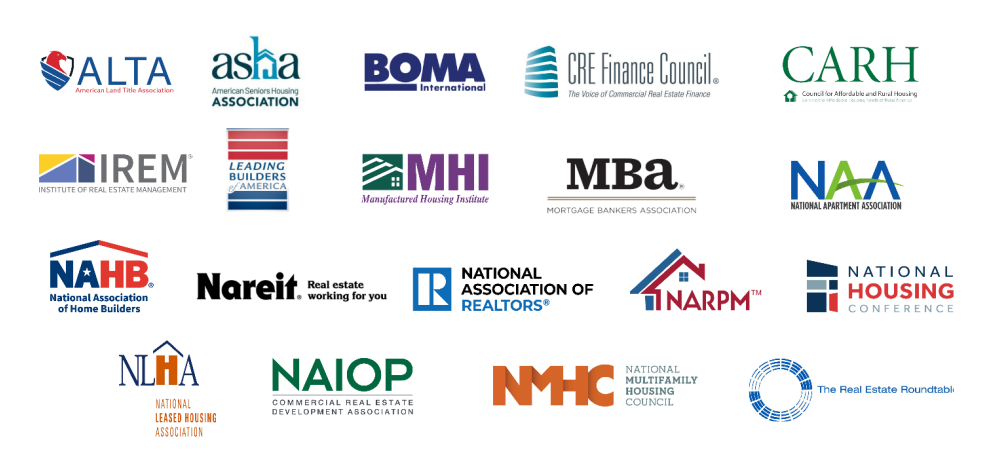NAA and Real Estate Associations Comment Letter on the Recent Proposal to Cap Rents Nationwide
NAA and national real estate associations write to The White House to express their strong opposition to the recent proposal to cap rents nationwide.

July 22, 2024
President Joseph R. Biden, Jr.
The White House
1600 Pennsylvania Ave, NW
Washington, D.C. 20025
Dear Mr. President:
The undersigned national real estate associations represent a broad coalition of housing providers and lenders that are committed to working together with your administration and Congress to address America’s housing affordability crisis. Unfortunately, we face serious obstacles in addressing rising housing costs and delivering much-needed supply. Today, we write to share our strong opposition to your recent proposal to cap rents nationwide. Rent control policies have proven time and again to increase rents, reduce the capital needed to boost the supply of housing, and ultimately hurt renters today and in the future.
We understand the appeal of what appears to be a quick fix to stabilize rents, but arbitrary federal rent caps are not the answer. Rent regulations jeopardize the financial solvency of rental communities, result in lower quality housing options for renters,[1] and severely limit their housing choices. Moreover, adding to what is already an overly complicated set of federal, state, and local compliance responsibilities for housing providers will disincentivize housing investors, further exacerbating the supply shortage and making housing even less affordable for renters. We ask that you reject rent control and instead increase subsidies for those in need and work with housing providers on proven solutions – such as those outlined in your administration’s Housing Supply Action Plan – to expand the supply of needed affordable housing.
Decades of academic research from across the United States and around the world clearly show that rent control reduces the supply of available housing and fails to target those renters most in need, while simultaneously harming other residents and the communities they reside in.[2] In a San Francisco case study, for example, the National Bureau of Economic Research (NBER) found that rent control “reduced rental housing supply by 15%, causing a 5.1% city-wide rent increase.”[3]
Economists agree: “Rent control has been about as disgraced as any economic policy in the tool kit. The idea we’d be reviving and expanding it will ultimately make our housing supply problems worse, not better,” said Jason Furman, who served as a top economist in the Obama administration and is now a professor at Harvard.
Not only does rent control not contribute to housing infrastructure, but it also disincentivizes necessary housing investments across markets, particularly in communities that already have few affordable options. Moreover, rent control disproportionately benefits higher-income renters who have little incentive to move, thereby impeding access for lower-income households.[4]
Rent control does not build a single home, and it ignores the real reasons for increases in housing costs, including rapidly rising insurance costs, state and local taxes, and other economic factors. Further, it disincentivizes needed housing investments, particularly in communities that already have few affordable options. The administration’s suggestion that a two-year rent cap plan would allow time for more housing to be built is simply untrue. In fact, in a 2022 survey, 87.5% of multifamily developers said that they avoid building in jurisdictions with rent control in place.[5] Moreover, rent caps will result in a more deteriorated existing housing stock.[6]
We share your commitment to addressing the housing affordability crisis in our nation. Our organizations have long been strong supporters of voluntary programs supported by the Federal government, including the Low-Income Housing Tax Credit (LIHTC), expansion of the Section 8 programs, and other federal programs that provide the financial resources necessary for developers to create more affordable units. The lack of resources invested in such voluntary efforts over time means that only one in four Americans in need of housing assistance receives it, resulting in a severe shortage of affordable housing opportunities. We call on the Administration and Congress to dedicate more funding and resources for programs that assist those families in need and have the potential to increase development and preservation opportunities for low-and moderate-income households who need it the most.
Implementing failed policies such as rent control will create instability in an already challenged market and undermine the important goals of fostering a healthy and equitable housing market, increasing supply, and creating successful communities where people of all backgrounds can build their lives. As such, we respectfully encourage your administration to refrain from implementing policies like rent control and instead focus on leveraging federal resources to build the housing America needs.
Sincerely,
American Land Title Association
American Seniors Housing Association
BOMA International
Council for Affordable and Rural Housing
Commercial Real Estate Finance Council
Institute of Real Estate Management
Leading Builders of America
Manufactured Housing Institute
Mortgage Bankers Association
NAIOP, Commercial Real Estate Development Association
Nareit
National Apartment Association
National Association of Home Builders
NATIONAL ASSOCIATION OF REALTORS®
National Association of Residential Property Managers
National Housing Conference
National Leased Housing Association
National Multifamily Housing Council
The Real Estate Roundtable
[1] https://www.naahq.org/ripple-effect-rent-regulation-and-its-effects-housing-and-neighborhood-quality
[2] https://www.nmhc.org/globalassets/research--insight/research-reports/rent-regulation/rent_regulation_policy_in_the_united_states_2024.pdf
[3] https://www.nber.org/system/files/working_papers/w24181/w24181.pdf
[4] https://www.nmhc.org/globalassets/research--insight/research-reports/rent-regulation/rent_regulation_policy_in_the_united_states_2024.pdf
[5] https://www.nmhc.org/globalassets/research--insight/research-reports/cost-of-regulations/2022-nahb-nmhc-cost-of-regulations-report.pdf
[6] https://www.naahq.org/ripple-effect-rent-regulation-and-its-effects-housing-and-neighborhood-quality